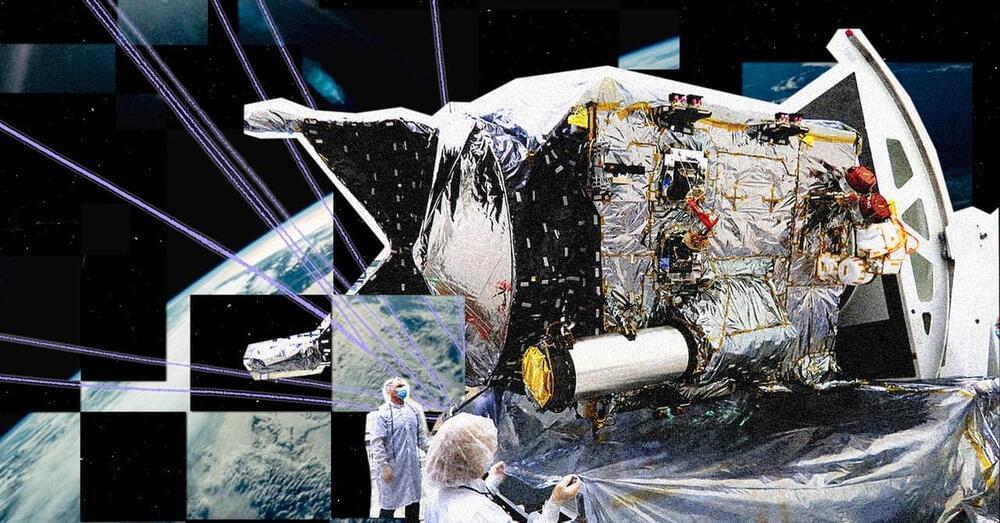The Psyche probe is heading to its namesake metal-rich asteroid. Along the way, it will demonstrate a near-infrared laser system to send high-rate data hundreds of millions of miles home.


Watch live as NASA astronaut Frank Rubio, the new record holder for the longest single U.S. spaceflight, returns home from the International Space Station. T…


AI was used to assist in writing this article.
As we stand on the cusp of the third decade of the 21st century, it’s impossible not to wonder what the world will be like in 20 years. Technology is advancing at an unprecedented pace, reshaping the way we live, work, and interact with the world around us. While we can’t predict the future with absolute certainty, we can make some educated guesses based on current trends and emerging technologies. Here’s a glimpse into what life may look like in the year 2043.
Artificial Intelligence Everywhere Artificial intelligence (AI) will continue to permeate every aspect of our lives. AI-driven personal assistants will become even more sophisticated, anticipating our needs and managing various aspects of our daily routines. From smart homes that adjust to our preferences in real-time to AI-powered healthcare diagnostics, AI will be omnipresent.
This is a sci-fi documentary, looking at the 100 years it will take a nuclear fusion spacecraft to travel to Proxima Centauri b. The closest habitable planet to Earth, with a distance of 4.24 light years.
A journey venturing far beyond Earth’s solar system, showing the future science of space travel, exploration, and future space technology.
Personal inspiration in creating this video comes from: the movie Interstellar, The Expanse TV show, and Carl Sagan’s Cosmos TV show.
Other topics in the video include: the population growth over the 100 year timelapse journey to Proxima Centauri b, how bacteria evolves in a closed loop system, the design of the spaceship habitat ring, the rotations per minute needed to generate 1-g of artificial gravity, the conservation of angular momentum in space, the living conditions on Proxima Centauri b (the higher gravity, and the red light), and time dilation is explained (how many extra days will pass on Earth when the spaceship arrives at the destination planet – just like the movie Interstellar).
Created by: Jacob B
Narration by: Alexander Masters.
Proxima Centauri B concept art: ESO/M. Kornmesser.

Architecture studio KKAA YTAA has completed a home with a central courtyard named House in Front of a School in Nara, Japan.
Located in the densely populated capital of Japan’s Nara Prefecture, the house was split into two parts that are connected by a bridge across a central courtyard.
The unusual arrangement was created as the client wanted a space that supported their work-from-home lifestyle and gave them access to the outdoors.

If you haven’t had the experience yourself, you’ve likely heard the horror stories: Someone shows up to their Airbnb and finds the pool is overgrown with algae. The heat doesn’t work. Or a booking gets canceled at the last minute leaving travelers without a place to stay. Consistency and reliability have become an enormous Achilles heel for Airbnb, an issue that Chesky has long described as a managerial crisis that requires wrapping his arms around millions of hosts in hundreds of thousands of locations—and not stripping them of their individuality.
“Our system,” says Chesky—referring to the disruptive tech platform where “adventurous travelers” could buy and sell products (in this case, rooms or homes), process secure payments and leave reviews—“was designed for a much smaller company which grew like crazy.”
“To use a precise metaphor, it’s kind of like we never fully built the foundation. Like, we had a house and it had four pillars when we needed to have 10.”

The recent ratification of the IEEE 802.11bb standard represents a seismic shift in wireless communication, offering a new frontier that goes beyond Wi-Fi: LiFi (Light Fidelity). Utilizing infrared light instead of radio waves, this standard brings LiFi technology closer to mainstream adoption. This article delves into what this innovative standard means for various applications, including smart homes, healthcare, retail, and more.
The Core of IEEE 802.11bb
The IEEE 802.11bb standard serves as a robust framework for secure, reliable, and high-speed wireless communication. Unlike traditional LiFi that used visible light, this new standard utilizes infrared (IR) lightwaves, invisible to the human eye but highly effective for transmitting data at lightning speeds.
Wi-Fi signals can do much more than deliver streaming movies and music around the home, it turns out: they can also be used to identify shapes through solid walls, as demonstrated in recent experiments.
The ability for Wi-Fi to spot movement through walls has been shown off before, but the technology struggles with seeing anything that isn’t in motion.
To overcome that limitation, researchers from the University of California Santa Barbara (UCSB) designed a Wi-Fi setup to concentrate specifically on the edges of objects, much like a person might do an outline drawing.
Beguš is a linguist at the University of California, Berkeley. He got the chance, last summer, to observe sperm whales in their wild Caribbean habitat off the coast of the island nation of Dominica. With him were marine biologists and roboticists. There were also cryptographers and experts in other fields. All have been working together to listen to sperm whales and figure out what they might be saying.
They call this Project CETI. That’s short for Cetacean Translation Initiative (because sperm whales are a type of cetacean).
AI translates human languages with ease. Researchers are now using this tech to analyze the sounds of whales, rodents and many other animals.